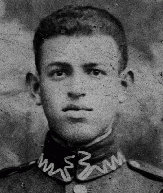
Fischel Felman
Born: 1911
Ostrow Mazowiecka, Poland
Fischel was the oldest of seven children in a Yiddish-speaking, religious Jewish family. When he was a small child, his parents moved the family to Sokolow Podlaski, a manufacturing town in central Poland with a large Jewish population of about 5,000. Fischel was sent to study at a religious school. In 1932, when he was 21 years old, Fischel was inducted into the Polish army.
1933-39: After two years in the Polish cavalry, Fischel returned to Sokolow Podlaski, where he apprenticed to become a carpenter and also led a local Zionist organization. He married and set up a carpentry shop in his home where he made furniture. When Germany attacked Poland on September 1, 1939, Fischel was called up by the Polish army. He was captured by the Germans, but was allowed to return home after fighting ended in October.
1940-42: For almost two years, Fischel managed to keep his carpentry workshop open although Sokolow Podlaski was occupied by the Germans. Then on September 28, 1941, the Germans set up a ghetto in the town and concentrated 4,000 Jews there. About a year later, on the most solemn Jewish holiday, the Day of Atonement, the Germans began to round up the people in the ghetto. Those who resisted or tried to hide were shot. With his wife and child, Fischel was herded onto the boxcar of a train.
On September 22, 1942, Fischel and his family were deported to the Treblinka killing center and gassed there shortly after arriving. He was 31 years old.

